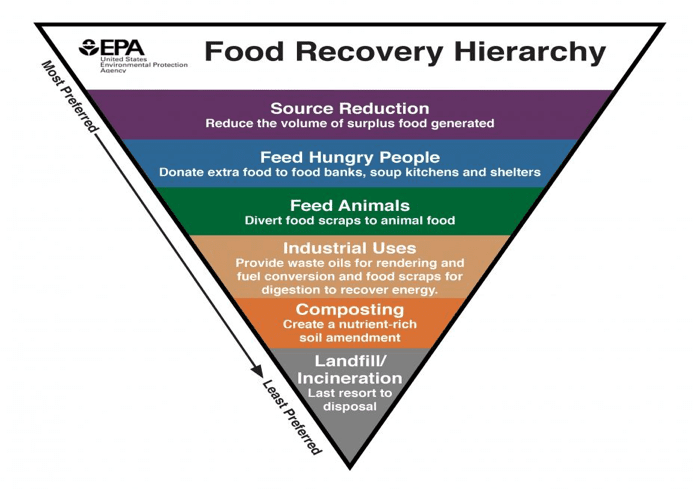By: Haley Singer, Undergraduate Student in Food Science and Human Nutrition at the University of Illinois Urbana-Champaign.
What is sustainable nutrition?
Sustainable nutrition is the impact of diet and the food system on the planet. Today, malnutrition continues to be a problem as the number of overweight people and hungry people continues to rise worldwide. On top of this, the food system is the cause of ⅓ of all greenhouse gas emissions and it is the main driver of species extinction.1 So what we put on our plate not only affects our health status, but it affects the health of the entire planet.
The big challenge we face is to fight both malnutrition and the climate crisis. The good news is a healthy, sustainable diet accomplishes both. To understand these diets, we must first talk about sustainability!

U.S. Environmental Protection Agency
Pictured here is the Food Recovery Hierarchy pyramid. It shows that the single most impactful thing you can do for the environment is to reduce the amount of waste you produce.2
Reducing Food Waste in a Single Household:
- Date Labels: It is important to remember that “Best if used by…” dates, are just quality indicators. As such, it is important to use your judgement to determine the freshness of the food, just because the best by date has passed does not mean that the food is not safe to eat.
- Repurposing Food Scraps: Make casseroles, stews, soups, stir-fries, and smoothies with leftover food scraps. Be sure to use all edible portions of the plant. For example, broccoli stems are 100% edible and nutritious.
- Watch Portion Sizes: Order or prepare what you think you will eat. You can always have a second helping if you are still hungry.
- Buy What You Need: Be cautious of buying in bulk or purchasing sale items just because of the price. If you believe that you will not eat the food items before they expire, then the sale did not help you.
- Freeze Unused Items: You can freeze leftovers or food items that you were not able to use to preserve their quality for longer.
- Plan Ahead: Plan your meals ahead of time and consider cross-utilizing ingredients.
What are healthy, sustainable diets?
A sustainable diet is a diet with a low impact on the environment. It contributes to food security and to a healthy lives for present and future generations.3 You do not need to exclude any food groups to eat more sustainably. A diet focused on plant-based foods such as fruits, veggies, legumes, beans, and nuts, and limited amounts of meat, fish, and animal products is both healthy and sustainable.
Why this is important for military families:
Out of the US military veterans who served in the wars in Iraq and Afghanistan since October 2001, over 1 in 4 soldiers (~27%) reported problems with food security (not knowing where their next meal will come from).4 Climate change poses a threat to both food security and food safety. It affects the production and availability of food.5 This can affect people’s ability to access food independent of their socioeconomic status. Sustainable eating makes you more aware of portion sizes which in turn helps to reduce food waste and save you money.
To begin eating a more nutritious and sustainable diet today, focus on reducing food waste and consuming a diet that consists mostly of plant-based foods.
References:
- Goucher, L., Bruce, R., Cameron, D. D., Lenny Koh, S. C., & Horton, P. (2017). The environmental impact of fertilizer embodied in a wheat-to-bread supply chain. Nature plants, 3, 17012. https://doi.org/10.1038/nplants.2017.12
- “Food Recovery Hierarchy.” EPA, Environmental Protection Agency, 18 Nov. 2019, www.epa.gov/sustainable-management-food/food-recovery-hierarchy.
- Meyer, N., & Reguant-Closa, A. (2017). “Eat as If You Could Save the Planet and Win!” Sustainability Integration into Nutrition for Exercise and Sport. Nutrients, 9(4), 412. https://doi.org/10.3390/nu9040412
- Widome, R., Jensen, A., Bangerter, A., & Fu, S. S. (2015). Food insecurity among veterans of the US wars in Iraq and Afghanistan. Public health nutrition, 18(5), 844–849. https://doi.org/10.1017/S136898001400072X
- Myers SS, Smith MR, Guth S, Golden CD, Vaitla B, Mueller ND, Dangour AD, Huybers P. Climate Change and Global Food Systems: Potential Impacts on Food Security and Undernutrition. Annu Rev Public Health. 2017 Mar 20;38:259-277. doi: 10.1146/annurev-publhealth-031816-044356. Epub 2017 Jan 6. PMID: 28125383.
Photo by Akil Mazumder from Pexels















